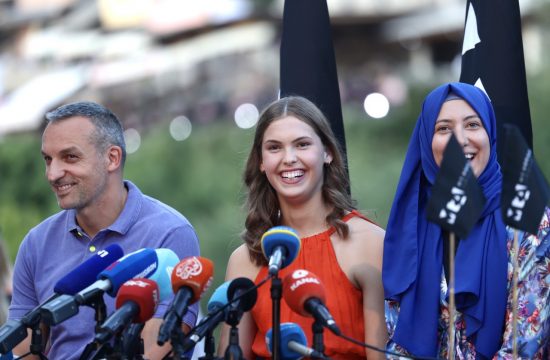
Former Croatian President Stjepan Mesic said in his reaction to the letter of former High Representatives who warned EU’s Federica Mogherini against Croatia’s meddling in Bosnian inner affairs, that he fully understands their concerns and supports their letter.
Paddy Ashdown, Christian Schwarz-Schilling and Carl Bildt expressed a concern over the stance some of the Croatian officials demonstrated towards the the election of social-democrat Zeljko Komsic to the Presidency of Bosnia and Herzegovina.
The institution of the High Representative is appointed by the international community to monitor the civilian implementation of the Dayton Peace Agreement, which ended the 1992-1995 war in Bosnia.
In his open letter, Mesic said that Croatia should have clearly supported Komsic’s election and it should stop all activities aimed at delegitimising his election.
With regard to their letter, Mesic said it was important to say that he fully supports their standpoint.
“I think the concerns of the former three High Representatives are completely justified and I think the Croatian Government should take the letter sent to EU’s High Representative Foreign Affairs and Security Policy,” Mesic noted.
“It is a fact that the Croatian and world see the situation in Bosnia differently than it really is. It is a fact Bosnian laws are wrongly interpreted, and that is what worries me, as former Croatian president, the most.” Mesic said. “Croatia’s concern for ethnic Croats living in the friendly, neighbouring country of Bosnia and Herzegovina comes down to Croatian Democratic Union’s (HDZ) concerns for their sister party’s interests in that country, the Croat Democratic Union (HDZ BiH).”
Mesic adds that he thinks this only harms the Bosnian Croats, as a constituent people in Bosnia.
Bosnia and Herzegovina consists of two semi-autonomous entities and three constituent peoples. The Bosniak-Croat dominated Federation of Bosnia and Herzegovina (FBiH) and the Serb-dominated Republika Srpska entity. Its Presidency consists of three members coming from the three constituent peoples. Bosniak and Croat members are elected in the FBiH, while the Serb member is elected in the RS.
During the October general election in Bosnia, the left-leaning Zeljko Komsic defeated his main opponent, the nationalist HDZ BiH’s leader Dragan Covic who then went on saying Komsic’s election was not legitimate because he was elected by Bosniak voters outnumbering the Croat voters.
Croatian officials, mostly coming from the HDZ joined in and went on a diplomatic offensive across the EU, claiming that Komsic does not represent Bosnian Croats and their interests.
“Mr Komsic was elected in line with the same law under which Mr Covic was twice elected for the seat of the Croat Presidency member. There were no protests then. Now the official Zagreb initiated a diplomatic offensive to compromise Mr Komsic as Presidency member and as a person,” Mesic noted. “Such activities are unfounded and seriously question Croatia’s credibility as a stability factor in southeast Europe.”




